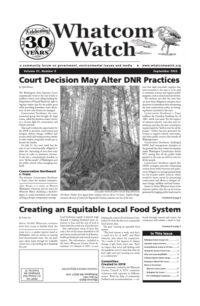by Luisa Loi
Many Whatcom residents — 30,000, according to the Whatcom County Health Department — don’t have access to healthy and affordable food, the local freshwater supply is limited, high demand is making farmland more expensive to buy, and the cost of food is lower than the actual cost of production.
This unfortunate series of facts lists only a few of the issues identified in 50 interviews conducted with local farmers, health professionals and natural resource experts. The information, included in the latest Whatcom County Food Assessment (1) released in 2021, is now helping the county’s Food System Committee (2) draft the first ever countywide food system plan.
The goal: creating an equitable food system.
“The food system is weak, and that’s a result of a lot of stuff,” said Riley Sweeney, who chairs the committee. “As a result of the impacts of climate change, it gets worse every year. That’s an impact that we’re still dealing with the pandemic, but it’s clear that what we have right now isn’t meeting our needs as a community.”
Committee Created in 2018
The committee, created by the Whatcom County Council in 2018, comprises volunteers with expertise in different sectors. With the help of community feedback and recommendations — collected through surveys and events, the committee will submit a draft in September with goals and strategies that stakeholders will rank in order of importance to determine which issues take priority.
The 10-year plan would be adopted in January. The committee will also oversee and regularly update the plan while also relying on community partners to carry out some of the work, according to Ali Jensen, a program specialist who works for the Whatcom County Health Department.
To successfully tackle the systemic failures identified, it is important to understand that the food system is a complex network of people and activities that includes farming, fishing, agriculture, processing, distribution, consumption and waste.
“You can’t fix our food system by only looking at one wheel, right?” said Sweeney. “You’ve got to look at all the pieces.”
Jensen said the plan is long overdue.
“Our food system has several weak and broken points,” Jensen said. “We know that things like a changing climate, a shifting workforce, an aging workforce, and an ever-chaotic economic outlook are going to further weaken our food system.”
Competing Issues
With many competing issues, it’s hard to decide where to start, Sweeney said. Thus far, survey respondents — including farmworkers, natural resource experts, and food distributors — have indicated “building a vibrant and resilient community” as the most important goal, followed by protecting and regenerating the soil, water and land, according to Jensen.
As the population in Whatcom County increases, the expansion of developed areas is causing available farmland to decrease, according to the assessment. Because of the competition with foreign markets, employers offer workers lower wages and limited hours to avoid paying benefits. Many local farmers who directly sell their products make less than a living wage as well, and are unable to pay for the land, according to the 2021 food assessment.
These issues may discourage people from becoming farmers or from selling their products in places where they can make more profits, like Snohomish and King counties.
Ground and surface water represent a significant health risk due to the contamination from sources such as leaky septic systems, stormwater and agricultural runoff, and salt water brought by rising sea levels caused by climate change. Furthermore, at least 50 percent of agricultural operations are irrigated without legal water rights or don’t comply with requirements, meaning they can lose access to water at any time, the assessment says.
Chemical Use
Most farmland in the county is used to grow food that is sold to foreign countries and is heavily reliant on chemical pesticides and fertilizers, with significant impact on the quality of the soil for decades. According to the 2017 Census of Agriculture, only 2 percent of local farmers used organic practices, the majority of which being export crop farmers.
The county and the groups carrying out the plan will gauge costs once the draft has been developed. Despite the challenges, Jensen and Sweeney trust the community will significantly help in finding feasible solutions.
“Our food system can be so much better,” Sweeney said. “We could be eating nutritious, healthy food made by people just down the street who are living a vibrant and full life where they’re paid and respected. Other communities have figured out how to do it [such as Spokane County] and we can get there, too.”
Read the Whatcom County Food Assessment here: https://www.whatcomcounty.us/DocumentCenter/View/59394/Community-Food-Assessment-Draft-2021.
Whatcom County Food System Goals
• Cultivate equity and justice.
• Protect and regenerate our soil, water, and land.
• Build a resilient and vibrant local food economy.
• Ensure access to healthy food for all.
• Adapt our community food system to a changing climate.
Members of the Food System Committee
Members are appointed by the Whatcom County Executive and confirmed by the County Council. They serve four-year terms with a two-term limit.
• Margaret Gerard – Local Sales Farming
• Riley Sweeney – Food Access (Chair)
• Amber Noskoff – Nutrition/Public Health
• Krista Rome – Natural Resources
• Rhys-Thorvald Hansen – Whatcom Food Network
• Vacant – Export Sales Farming
• Sean Hopps – Labor Issues
• Nikki Oleson – Processing/Distribution
• Paul Burrill – Fishing Industry
Applications for the vacancy are available at: https://www.whatcomcounty.us/FormCenter/Boards-and-Commissions-16/Board-and-Commission-Application-88
References
(1) Healthy Communities Program, Whatcom County, WA – Official Website
(2) https://www.whatcomcounty.us/2992/Food-System-Committee
__________________________
Luisa Loi is a student reporter based in Bellingham, with an interest in covering local environmental issues. You can learn more about Luisa through her LinkedIn (Luisa Loi), or by reaching out to luisaloi@ live.com




























